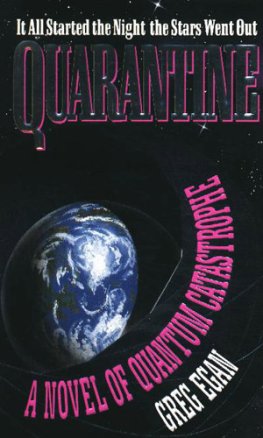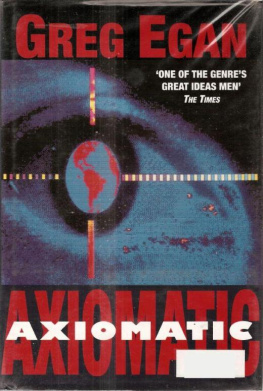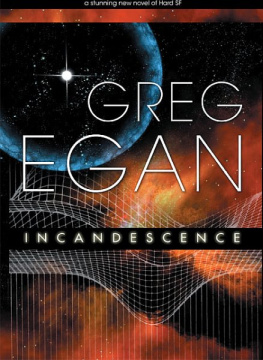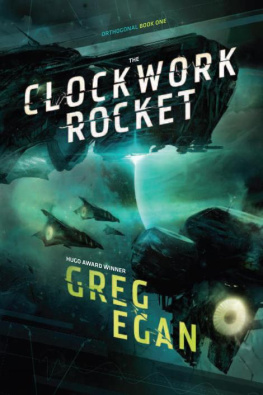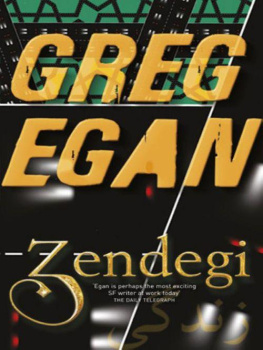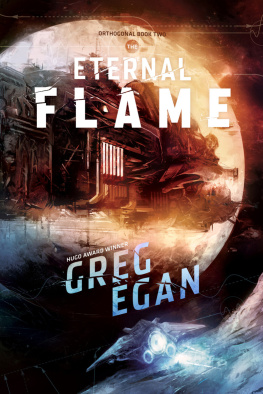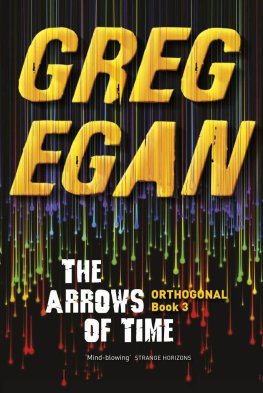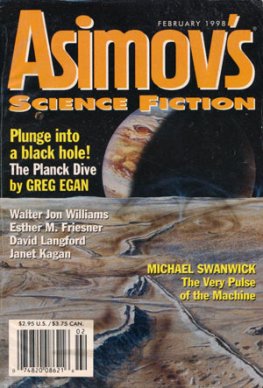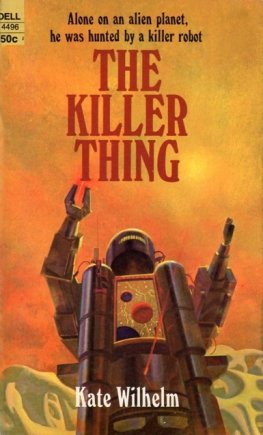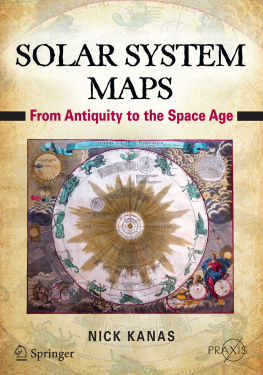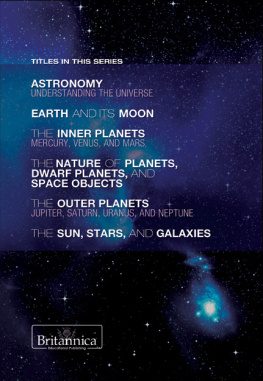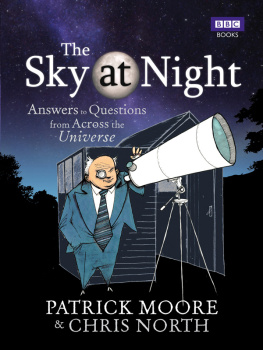Copyright Greg Egan 1992 All rights reserved
The right of Greg Egan to be identified as the author of this work has been asserted by him in accordance with the Copyright, Designs and Patents Act 1988.
This edition published in Great Britain in 1999 by Millennium An imprint of Victor Gollancz Orion House, 5 Upper St
Martin's Lane, London WC2H 9EA
To receive information on the Millennium list, e-mail us at:A CIP catalogue record for this book is available from the British Library ISBN 1 85798 590 7
Printed in Great Britain by Clays Ltd, St Ives pic
Only the most paranoid clients phone me in my sleep.
Of course, nobody wants a sensitive call electronically decoded and flashed up on the screen of an ordinary videophone; even if the room isn't bugged, radio-frequency spillage from the unscrambled signal can be picked up a block away. Most people, though, are content with the usual solution: a neural modification enabling the brain to perform the decoding itself, passing the results directly to the visual and auditory centres. The mod I use, CypherClerk (NeuroComm, $5,999), also provides a virtual larynx option, for complete two-way security.
However. Even the brain leaks faint electric and magnetic fields. A superconducting detector planted on the scalp, no bigger than a flake of dandruff, can eavesdrop on the neural data flow involved in an act of ersatz perception, and translate it almost instantaneously into the corresponding images and sounds.
Hence The Night Switchboard (Axon, $17,999). The nano-machines which carry out this modification can take up to six weeks to map the user's idiosyncratic schemata the rules by which meanings are encoded in neural connections but once that's done, the intermediary language of the senses can be bypassed completely. What the caller wants you to know, you know, without any need to hallucinate a talking head spelling it out, and the electromagnetic signature at skull level is, for all practical purposes, inscrutable. The only catch is, in the conscious state, most people find it disorienting and at worst traumatic to have information crystallizing in their heads without the conventional preliminaries. So, you have to be asleep to take the call.
No dreams; I simply wake, knowing:
Laura Andrews is thirty-two years old, one hundred and fifty-six centimetres tall, and weighs forty-five kilograms. Short, straight brown hair; pale blue eyes; a long, thin nose. Anglo-Irish features and deep black skin; like most Australians, born with insufficient UV protection, she's been retrofitted with genes for boosted melanin production and a thicker epidermis.
Laura Andrews has severe congenital brain damage; she can walk and eat, clumsily, but she can't communicate in any fashion, and the experts say that she understands the world little better than a six-month-old child. Since the age of five, she's been an in-patient at the local Hilgemann Institute.
Four weeks ago, when an orderly unlocked her room to serve breakfast, she was gone. After a search of the building and grounds, the police were called in. They repeated and extended the search, and conducted a doorknock of the surrounding area, to no avail. Laura's room bore no signs of forced entry, and recordings from security cameras proved unenlightening. The police interviewed the staff at length, but nobody broke down and owned up to spiriting the woman away.
Four weeks later, nothing. No sightings. No corpse. No ransom demands. The police have not officially abandoned the case merely deprioritized it, pending further developments.
Further developments are not anticipated.
My task is to find Laura Andrews and return her safely to the Hilgemann or locate her remains, if she's dead and to gather sufficient evidence to ensure that those responsible for her abduction can be prosecuted.
My anonymous client presumes that Laura was kidnapped, but declines to suggest a motive. Right now, my judgement is suspended. I'm in no state to hold an opinion on the matter; I have a head full of received knowledge, coloured by my client's perspective, possibly even tainted with lies.
I open my eyes, then drag myself out of bed and over to the terminal in the corner of the room; I make it a policy never to deal with financial matters in my head. A few keystrokes confirm that my account has been provisionally credited with a satisfactory down payment; accepting the deposit will signal to the client that I've taken the case. I pause for a moment to think back over the details of the assignment, trying to reassure myself that I really do understand it there's always a hint of dream-logic to these calls, a faint but implacable suspicion that by morning none of what I've learnt will even make sense then I authorize the transaction.
It's a hot night. I step out on to the balcony and look down towards the river. Even at three in the morning, the water is crowded with pleasure craft of every size, from luminescent sailboards, softly glowing orange or lime green, to twelve-metre yachts, crisscrossed with spotlight beams brighter than daylight. The three main bridges are thick with cyclists and pedestrians. To the east, giant holograms of cards, dice and champagne glasses strobe and pirouette above the casino. Doesn't anyone sleep any more?
I glance up at the empty black sky, and find myself, inexplicably, entranced. There's no moon tonight, no clouds, no planets, and the featureless darkness refuses to sustain any comforting illusion of scale; I might be staring at infinity, or the backs of my own eyelids. A wave of nausea passes through me, a contradictory mixture of claustrophobia and a dizzying sense of The Bubble's inhuman dimensions. I shudder-a single, violent twitch-then the feeling is gone.
A mod-generated hallucination of my dead wife Karen, standing on the balcony beside me, slips an arm around my waist and says, 'Nick? What is it?' Her touch is cool, and she spreads her fingers wide across my abdomen, like antennae. I'm on the verge of asking her, by way of explanation, if she ever misses the stars, when I realize how ludicrously sentimental that would sound, and I stop myself in time.
I shake my head. 'Nothing.'
The grounds of the Hilgemann Institute are as lushly green as genetic engineering and brute-force reticulation can make them, in the middle of a summer when they ought to be dead and brown. The lawn glistens in the midmorning heat as if fresh with dew, no doubt constantly irrigated from just beneath the surface, and I trudge down the main access road in the shade of what looks like a kind of maple. An expensive image to maintain; the rates for frivolous water use, already punitive, are tipped to double in the next few months. The third Kimberley pipeline, bringing water from dams twenty-five hundred kilometres to the north, is four hundred per cent over budget so far, and plans for a desalination plant have been shelved, yet again apparently, a glut on the ocean minerals market has undermined the project's viability.
The road ends in a circular driveway, enclosing a lavish flower bed in spectacular polychromatic bloom. The trademark IS gene-tailored hummingbirds hover and dart above the flowers; I pause for a moment to watch them, hoping in vain to witness just one contravene its programming by straying from the circle.
The building itself is all mock-timber; the layout suggests a motel. There are Hilgemann Institutes around the world, through no fault of anyone called Hilgemann; it's widely known that International Services paid their marketing consultants a small fortune to come up with the 'optimal' name for their psychiatric hospital division. (Whether public knowledge of the name's origin spoils the optimization, or is in fact the strongest basis for it, I'm not sure.) IS also runs medical hospitals, child-care centres, schools, universities, prisons and, recently, several monasteries and convents. They all look like motels to me.
Next page
